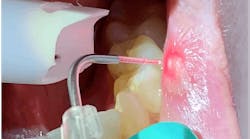Overhead expense disability insurance: A prudent way to protect your dental practice
Editor’s note: Part three of a three-part series on disability insurance for dentists and students. Read part one, Disability insurance 101: "Own occupation" and "noncancellable and guaranteed renewable" and part two, "Time frames and riders: How should you design your disability insurance plan?"
In our first two articles, we discussed the finer points of what to look for in an individual disability insurance policy. These policies frequently help a dentist pay their personal bills and maintain lifestyle for themselves and their families in the event of an accident or log-term illness. But what about your practice? Here we take a closer look at overhead expense disability insurance.
Scenario: You’ve just had a terrible car accident. You are riding in the back of the ambulance on the way to the emergency department at your local hospital. Once the initial shock wears off, a number of questions come to mind:
- Can I ever practice dentistry again?
- Did I pay my last disability insurance premium?
- How much disability insurance do I actually have?
- Can I get a replacement dentist in?
- Can I or should I sell my practice?
- Will my patients stick with me?
- Will my staff stick with me?
These and many other questions come into play. Your individual income isn’t the only thing that should be insured—you should also have a similar, yet also different, policy that protects your practice.
Overhead expense policy (also called business overhead expense policy)
This type of policy pays the expenses of the practice including payroll, rent, and utilities of the policy holder due to injury or sickness. If you own a practice, you should strongly consider this, especially if you’re also responsible for a good portion of the revenue of the practice.
A true benefit for your practice, overhead expense policies often kick in after 30 or 60 days, so you don’t need to wait the full 90 days you see with typical individual disability insurance policies for cash to flow into your business. Pay amounts for general dentists for individual disability insurance policies often range from $5000 to $20,000 per month, where overhead expense policies typically range from $10,000 to as much as $50,000, an obvious plus for a busy practice.
An important distinction is also how long the policies pay out. With individual disability Insurance policies, it is common to see payouts to retirement age. With overhead expense policies, however, the payout is usually for 12 to 24 months. The reasoning is simple: if you own a practice, you will likely have a sense of what you’d like to do with your practice within the first two years after your accident or illness.
Having an overhead expense policy will:
- Buy time: If you have an accident that abruptly ends your ability to even walk into the office Monday morning, having the knowledge that $30,000, for example, of revenue will be paid for a year or two to cover staff wages, rent, utilities, and other expenses of the business can provide a lot of comfort. This allows time to create a game plan for the practice. At the very least, you know you can pay your staff, keep hygiene running, and possibly add an associate to run things while you work with your family, lawyer, accountant, and broker to consider your options.
- Create certainty: This lets your staff know that whatever happens, you have a clear plan and payroll will continue for the duration. In this tight labor market, sharing with your team that you have contingency plans might make the difference in where they choose to work. I am not suggesting this is a panacea; it is simply one more indication that you’re thinking of the entire team when planning for your practice. This doesn’t replace inclusive culture, team-building, and great mentorship. It simply enhances that good work you’re already doing.
- Maintain value: All too often, we hear about the dentist across town who had an accident or was diagnosed with cancer. They have two tasks: attending to their health, a very personal and all-encompassing endeavor, and determining the disposition of their practice. If you have overhead expense and there is an emergency plan in place, no rash decisions need to be made. When and if the practice is sold, it will be at full value and on your terms.
Other questions to consider
There are nuances, as with individual disability insurance policies:
- Is the benefit taxable? You should consult your tax expert, but this policy has a unique ability to be paid by the practice and have the benefit some in tax-free.
- Can you start with a smaller plan and grow into more coverage as your practice grows? There are riders that allow you to buy more coverage later without answering new medical questions. This can prove invaluable!
- Can you pay for a replacement dentist out of the benefit? Possibly! This is why you should consult with a dental-specific disability insurance broker. They can help you make all of these decisions from their past experience with other clients.
Authors' note: This series was meant to be comprehensive, but to give busy dentists and dental students a bit more information than perhaps they had. If you who has more questions, feel free to reach out to Jim Kachmar at [email protected] or (207) 671-2216 or Rick Lunetta at [email protected] or (781) 308-7930.






